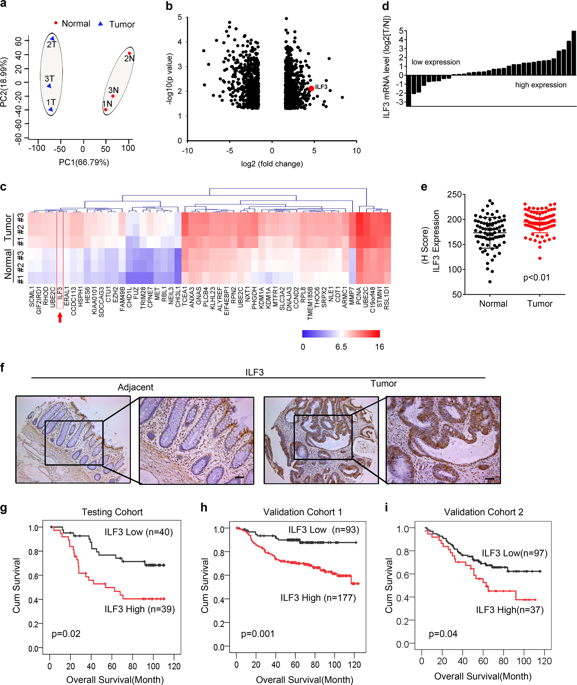Our official English website, www.x-mol.net, welcomes your
feedback! (Note: you will need to create a separate account there.)
ILF3 is a substrate of SPOP for regulating serine biosynthesis in colorectal cancer.
Cell Research ( IF 28.1 ) Pub Date : 2019-11-26 , DOI: 10.1038/s41422-019-0257-1 Kai Li 1, 2 , Jian-Lin Wu 3 , Baifu Qin 1, 2 , Zongmin Fan 1, 2 , Qin Tang 1, 2 , Weisi Lu 4 , Haipeng Zhang 5 , Fan Xing 6 , Manqi Meng 1, 2 , Shaomin Zou 1, 2 , Wenxia Wei 1, 2 , Honglei Chen 7 , Jian Cai 7 , Huaiming Wang 7 , Hui Zhang 8 , Jiayue Cai 1, 2 , Ling Fang 9 , Xiqing Bian 3 , Chuangqi Chen 10 , Ping Lan 1, 2, 7 , Bart Ghesquière 11 , Lekun Fang 1, 2, 7 , Mong-Hong Lee 1, 2
Cell Research ( IF 28.1 ) Pub Date : 2019-11-26 , DOI: 10.1038/s41422-019-0257-1 Kai Li 1, 2 , Jian-Lin Wu 3 , Baifu Qin 1, 2 , Zongmin Fan 1, 2 , Qin Tang 1, 2 , Weisi Lu 4 , Haipeng Zhang 5 , Fan Xing 6 , Manqi Meng 1, 2 , Shaomin Zou 1, 2 , Wenxia Wei 1, 2 , Honglei Chen 7 , Jian Cai 7 , Huaiming Wang 7 , Hui Zhang 8 , Jiayue Cai 1, 2 , Ling Fang 9 , Xiqing Bian 3 , Chuangqi Chen 10 , Ping Lan 1, 2, 7 , Bart Ghesquière 11 , Lekun Fang 1, 2, 7 , Mong-Hong Lee 1, 2
Affiliation

|
The Serine-Glycine-One-Carbon (SGOC) pathway is pivotal in multiple anabolic processes. Expression levels of SGOC genes are deregulated under tumorigenic conditions, suggesting participation of oncogenes in deregulating the SGOC biosynthetic pathway. However, the underlying mechanism remains elusive. Here, we identified that Interleukin enhancer-binding factor 3 (ILF3) is overexpressed in primary CRC patient specimens and correlates with poor prognosis. ILF3 is critical in regulating the SGOC pathway by directly regulating the mRNA stability of SGOC genes, thereby increasing SGOC genes expression and facilitating tumor growth. Mechanistic studies showed that the EGF-MEK-ERK pathway mediates ILF3 phosphorylation, which hinders E3 ligase speckle-type POZ protein (SPOP)-mediated poly-ubiquitination and degradation of ILF3. Significantly, combination of SGOC inhibitor and the anti-EGFR monoclonal antibody cetuximab can hinder the growth of patient-derived xenografts that sustain high ERK-ILF3 levels. Taken together, deregulation of ILF3 via the EGF-ERK signaling plays an important role in systemic serine metabolic reprogramming and confers a predilection toward CRC development. Our findings indicate that clinical evaluation of SGOC inhibitor is warranted for CRC patients with ILF3 overexpression.
中文翻译:

ILF3是SPOP的底物,可调节结直肠癌丝氨酸的生物合成。
丝氨酸-甘氨酸-单碳(SGOC)途径在多种合成代谢过程中至关重要。在致瘤条件下,SGOC基因的表达水平被下调,表明癌基因参与了对SGOC生物合成途径的下调。但是,基本机制仍然难以捉摸。在这里,我们确定白细胞介素增强子结合因子3(ILF3)在原发性CRC患者标本中过表达,并且与不良预后相关。ILF3通过直接调节SGOC基因的mRNA稳定性,从而增加SGOC基因的表达并促进肿瘤生长,在调节SGOC途径中起着至关重要的作用。机理研究表明,EGF-MEK-ERK途径介导ILF3磷酸化,这阻碍了E3连接酶斑点型POZ蛋白(SPOP)介导的多泛素化和ILF3降解。显着地,SGOC抑制剂和抗EGFR单克隆抗体西妥昔单抗的组合可以阻碍维持高ERK-ILF3水平的患者来源异种移植物的生长。综上所述,通过EGF-ERK信号转导的ILF3失调在系统性丝氨酸代谢重编程中起着重要作用,并倾向于CRC的发展。我们的发现表明,对于ILF3过表达的CRC患者,必须对SGOC抑制剂进行临床评估。
更新日期:2019-11-27
中文翻译:

ILF3是SPOP的底物,可调节结直肠癌丝氨酸的生物合成。
丝氨酸-甘氨酸-单碳(SGOC)途径在多种合成代谢过程中至关重要。在致瘤条件下,SGOC基因的表达水平被下调,表明癌基因参与了对SGOC生物合成途径的下调。但是,基本机制仍然难以捉摸。在这里,我们确定白细胞介素增强子结合因子3(ILF3)在原发性CRC患者标本中过表达,并且与不良预后相关。ILF3通过直接调节SGOC基因的mRNA稳定性,从而增加SGOC基因的表达并促进肿瘤生长,在调节SGOC途径中起着至关重要的作用。机理研究表明,EGF-MEK-ERK途径介导ILF3磷酸化,这阻碍了E3连接酶斑点型POZ蛋白(SPOP)介导的多泛素化和ILF3降解。显着地,SGOC抑制剂和抗EGFR单克隆抗体西妥昔单抗的组合可以阻碍维持高ERK-ILF3水平的患者来源异种移植物的生长。综上所述,通过EGF-ERK信号转导的ILF3失调在系统性丝氨酸代谢重编程中起着重要作用,并倾向于CRC的发展。我们的发现表明,对于ILF3过表达的CRC患者,必须对SGOC抑制剂进行临床评估。











































 京公网安备 11010802027423号
京公网安备 11010802027423号